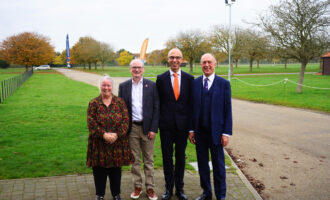George is the 4th generation of the family to farm over 350 hectares of root and combinable crops, providing contracting services for other landowners and rearing a beef herd. George is keen to promote and encourage a regenerative approach to farming and wanted to share his work with us.

We were treated to the warmest of welcomes on arrival, an interactive crop walk around the farm, an informative presentation and a hearty farmer’s lunch. The excitement of the team was only rivalled by George’s enthusiasm and passion for his subject and livelihood.
The crop walk took us to a field of each crop and soil type. George explained how each crop damages the soil, some more than others, such as sugar beet and potatoes. These are George’s main crops so he is constantly balancing profit with environmental considerations, understanding that soil health is the foundation of their crops and of the future success of the farm.

With the environment and the future of his soil in mind, George explained to us how he is trying to reverse the damage caused by intensive farming, whilst improving the soils and increasing his margins. He has already taken advice and action on new machinery purchases: new tractors are much lighter than previous tractors resulting in less soil compaction, less tyre wear and lower fuel costs. A direct combi-drill allows for multiple inputs such as seed and cover crops or spot applications at specific spacings and quantities to be applied in only one pass. This approach reduces soil compaction, improving the initial establishment of crops and reducing the amount of other applications required. Soil samples are taken and tested as part of a pest control plan; pesticides are not applied where they are not needed.

While cover crops incur a cost with little or no monetary return, their rewards in terms of stabilising and improving the soil, protecting it from weather and leaching, and increasing nutrient cycling cannot be underestimated. George is using nature to his advantage to improve the soil structure combined with his approach of doing what he can to minimise the damage from farming activities. The plan also includes the integration of livestock into the rotation by introducing herbal leys and expanding cover crops for grazing.

We were taken to a field of beans and George explained how, similar to cover crops, cultivating beans might not break even. However, their use as a break crop, with their inherent fertility benefit and very low fertiliser requirement, meant that they were working to improve the soil for the next crop to be sown. George explained that in a seven-year rotation, if six years are spent improving the soil and one year of growing sugar beet or potato puts that back three years, he is still three years of improvements ahead for the next crop.

The Agriculture and Farming team are very grateful to George for helping us to achieve a better understanding of the farm’s daily, yearly and rotational planning activities, and explaining the challenges and decisions that need to be made on the ground. As a team, we will expect to see agricultural trends of less application costs, a difference in the type of machines purchased and improvements in yields coming through in the records analysed as part of the year end accounts process. As advisers, our role has already evolved, with clients seeking us out for advice, as well as relying on us to prepare their accounts and tax returns.

Working with progressive clients such as George helps our advisers build on their awareness of the issues and opportunities faced by the agricultural sector. Our knowledge and experience enables us to understand our clients’ visions, their plans and motivations, and provide a holistic service which adds value to their business and gives them the confidence that their financial needs are being well managed.
Contact Clare at hello@scruttonbland.co.uk or phone 0330 058 6559 to find out more.







